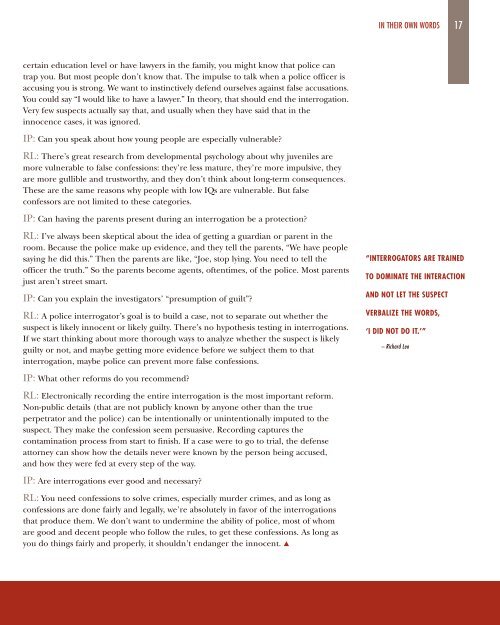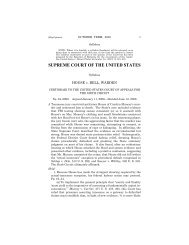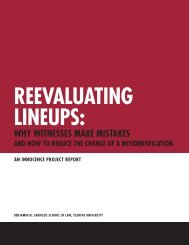The Innocence Project in Print - Summer 2011 (PDF)
The Innocence Project in Print - Summer 2011 (PDF)
The Innocence Project in Print - Summer 2011 (PDF)
- No tags were found...
You also want an ePaper? Increase the reach of your titles
YUMPU automatically turns print PDFs into web optimized ePapers that Google loves.
IN THEIR OWN WORDS17certa<strong>in</strong> education level or have lawyers <strong>in</strong> the family, you might know that police cantrap you. But most people don’t know that. <strong>The</strong> impulse to talk when a police officer isaccus<strong>in</strong>g you is strong. We want to <strong>in</strong>st<strong>in</strong>ctively defend ourselves aga<strong>in</strong>st false accusations.You could say “I would like to have a lawyer.” In theory, that should end the <strong>in</strong>terrogation.Very few suspects actually say that, and usually when they have said that <strong>in</strong> the<strong>in</strong>nocence cases, it was ignored.IP: Can you speak about how young people are especially vulnerable?RL: <strong>The</strong>re’s great research from developmental psychology about why juveniles aremore vulnerable to false confessions: they’re less mature, they’re more impulsive, theyare more gullible and trustworthy, and they don’t th<strong>in</strong>k about long-term consequences.<strong>The</strong>se are the same reasons why people with low IQs are vulnerable. But falseconfessors are not limited to these categories.IP: Can hav<strong>in</strong>g the parents present dur<strong>in</strong>g an <strong>in</strong>terrogation be a protection?RL: I’ve always been skeptical about the idea of gett<strong>in</strong>g a guardian or parent <strong>in</strong> theroom. Because the police make up evidence, and they tell the parents, “We have peoplesay<strong>in</strong>g he did this.” <strong>The</strong>n the parents are like, “Joe, stop ly<strong>in</strong>g. You need to tell theofficer the truth.” So the parents become agents, oftentimes, of the police. Most parentsjust aren’t street smart.IP: Can you expla<strong>in</strong> the <strong>in</strong>vestigators’ “presumption of guilt”?RL: A police <strong>in</strong>terrogator’s goal is to build a case, not to separate out whether thesuspect is likely <strong>in</strong>nocent or likely guilty. <strong>The</strong>re’s no hypothesis test<strong>in</strong>g <strong>in</strong> <strong>in</strong>terrogations.If we start th<strong>in</strong>k<strong>in</strong>g about more thorough ways to analyze whether the suspect is likelyguilty or not, and maybe gett<strong>in</strong>g more evidence before we subject them to that<strong>in</strong>terrogation, maybe police can prevent more false confessions.“INTERROGATORS ARE TRAINEDTO DOMINATE THE INTERACTIONAND NOT LET THE SUSPECTVERBALIZE THE WORDS,‘I DID NOT DO IT.’”– Richard LeoIP: What other reforms do you recommend?RL: Electronically record<strong>in</strong>g the entire <strong>in</strong>terrogation is the most important reform.Non-public details (that are not publicly known by anyone other than the trueperpetrator and the police) can be <strong>in</strong>tentionally or un<strong>in</strong>tentionally imputed to thesuspect. <strong>The</strong>y make the confession seem persuasive. Record<strong>in</strong>g captures thecontam<strong>in</strong>ation process from start to f<strong>in</strong>ish. If a case were to go to trial, the defenseattorney can show how the details never were known by the person be<strong>in</strong>g accused,and how they were fed at every step of the way.IP: Are <strong>in</strong>terrogations ever good and necessary?RL: You need confessions to solve crimes, especially murder crimes, and as long asconfessions are done fairly and legally, we’re absolutely <strong>in</strong> favor of the <strong>in</strong>terrogationsthat produce them. We don’t want to underm<strong>in</strong>e the ability of police, most of whomare good and decent people who follow the rules, to get these confessions. As long asyou do th<strong>in</strong>gs fairly and properly, it shouldn’t endanger the <strong>in</strong>nocent.
















